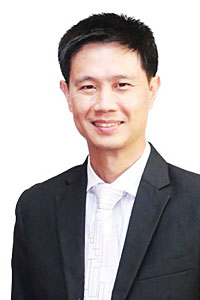
Journalists across the country celebrated their big day last Saturday, National Reporter's Day, not long after TV anchorman Sorrayuth Suthassanachinda, who was sentenced to more than 13 years in jail for embezzling money from MCOT, bowed to public pressure to go off the air.
On the occasion, Prime Minister Prayut Chan-o-cha issued a statement to reporters -- an unprecedented move by the country's leader in the six-decade history of Reporter's Day.
In the statement, read out to the media by chief government spokesman Sansern Kaewkamnerd, the prime minister urged the media to uphold national interests in reporting news and commentaries, serving its readers and viewers by remaining alert, and quickly detecting and reporting problems.
He called on the media to help boost the quality of life of the people, stay above vested interests, be non-partisan, while also putting the country first.

"Model media [members] should be remembered by their ethical practices and code of conduct, not controversies," Maj Gen Sansern quoted the premier as saying in the statement.
Gen Prayut asked the media, which can reach the people so quickly, to share more social responsibility, and showed his appreciation of more effective self-regulating practices, apparently referring to the fallout from the Sorrayuth saga.
The prime minister's words were generally right, except his call for the media to "present positive images of the nation to the world".
Such a view has no place in the 30-item Code of Ethics for members of the Press Council of Thailand that has been observed by newspapers since it took effect in 1998.
It is indeed a myth that many people in government -- military or civilian alike -- like to believe their policies are indeed designed for the public interest.
That is why all television and radio stations are obliged to report 6pm "daily news programmes" in which each ministry sends a representative to present the work it has done as well as the weekly address by the prime minister every Friday, which is re-run on Saturday morning. Although the public has 30 free-TV channels and dozens of radio stations, their choice is very limited -- listen, watch or switch off.
Privately-owned newspapers have slightly more freedom, and are not required to report government statements if they don't want to. What makes people pay for news in newspapers is of course not "positive images of the nation to the world", but rather news articles that interest them.
Items 4 and 7 of the Code say newspapers must uphold the truth and they must not make up false stories. So, when a foreign tourist is raped and killed in Thailand, we simply have to report the truth, not ignore it, though this will not "present positive images of the nation to the world".
When a human rights advocate group exposes labour abuses against migrant workers by large Thai corporations, newspapers must report them, not refrain from doing so for fear of tarnishing the country's image and hurting exports. But we must be neutral in our presentation and be fair to all parties mentioned in the story, as suggested by Items 6 and 8 of the Code.
The print media also needs to strike a balance between its economic survival and editorial independence as advertisers who represent corporate and government clients alike have been holding back on spending and trying to make their advertisements as credible as possible.
Media buying agencies always find leeway to disguise their commercials as editorial content, which goes against the Code's Item 19 that says advertisements in newspapers must present themselves as commercials that have been paid for and not news stories. At the Bangkok Post, we reject government advertorials that do not show who the sponsors are.
While the prime minister was urging the media to be honest in its role as a watchdog, the government must also be transparent when it comes to buying advertisements.
Gen Prayut is right to say that watchdogs must alert their owners to looming threats. Therefore, these dogs must not be gagged or muzzled by threats of detention or invitations for "attitude adjustment".
And in this case the owners are of course not some people in the government, but the people of Thailand.
Nopporn Wong-Anan is deputy editor, Bangkok Post.
